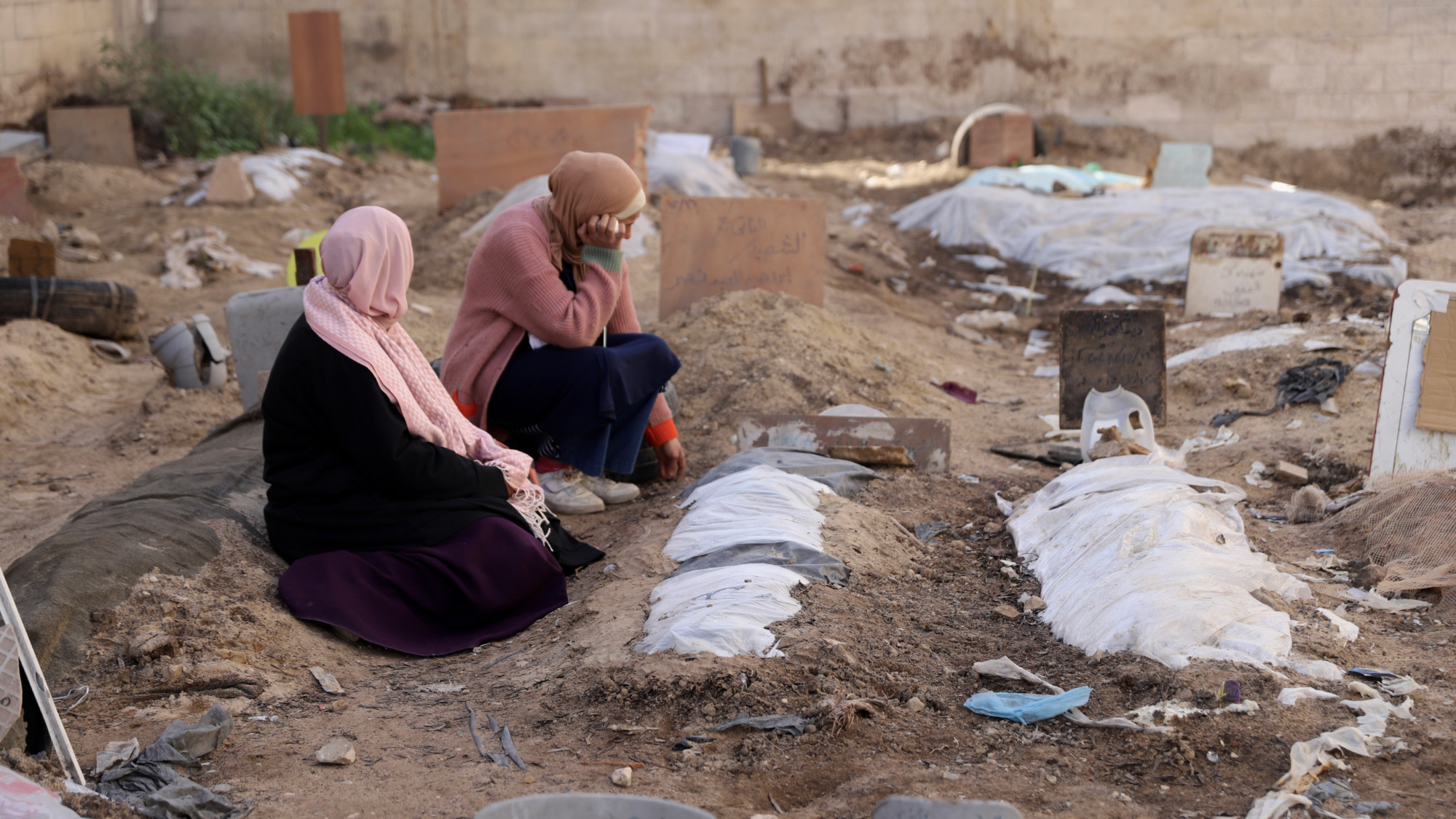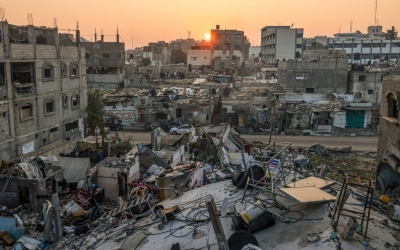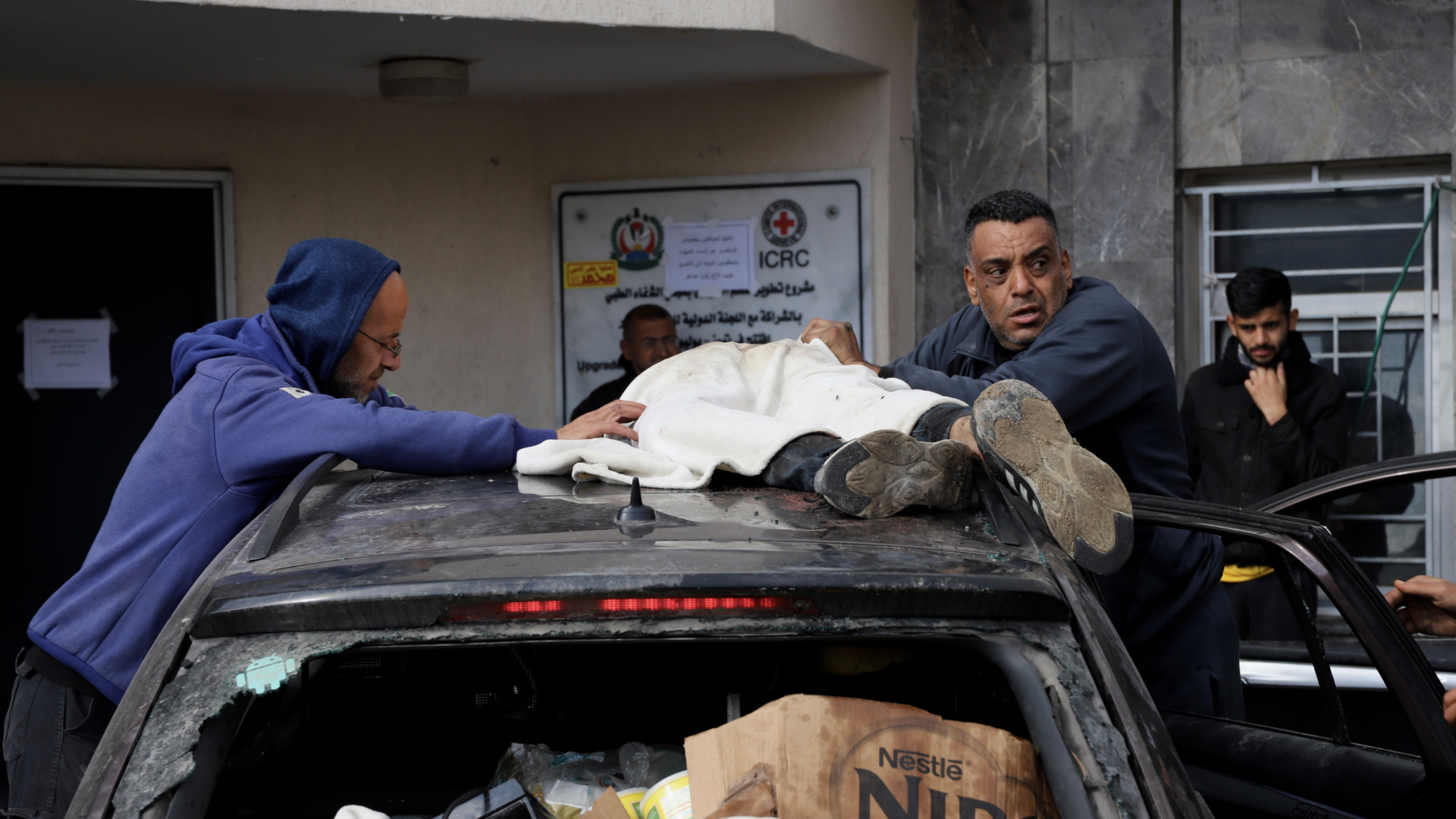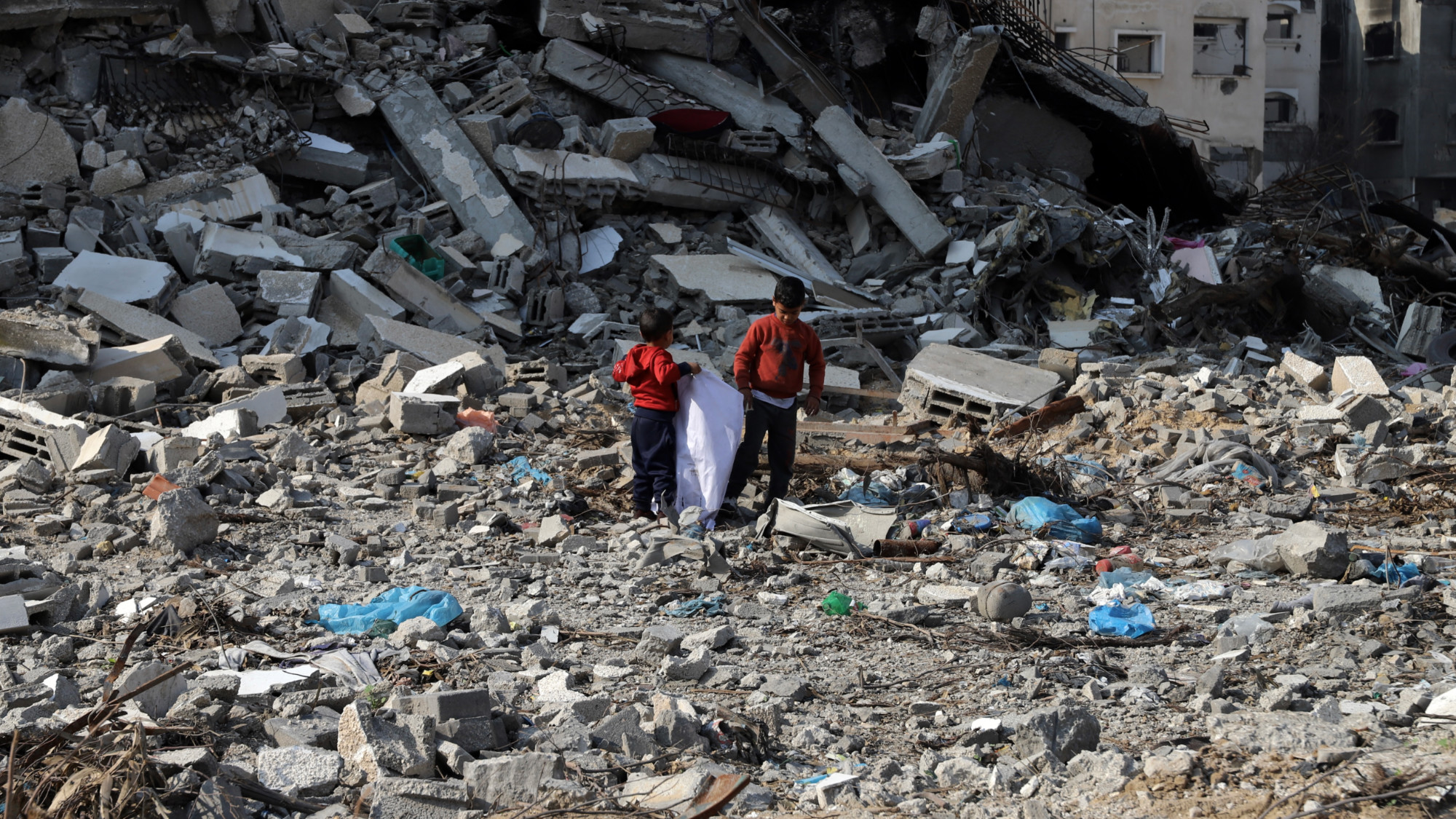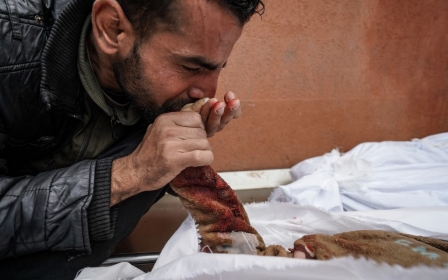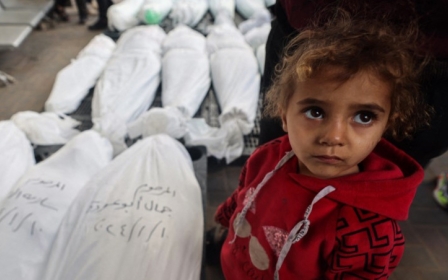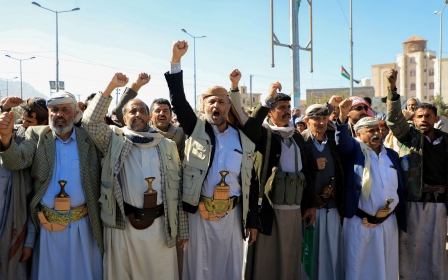100 days of war in Gaza: Besieged Palestinians feel isolated, abandoned and afraid
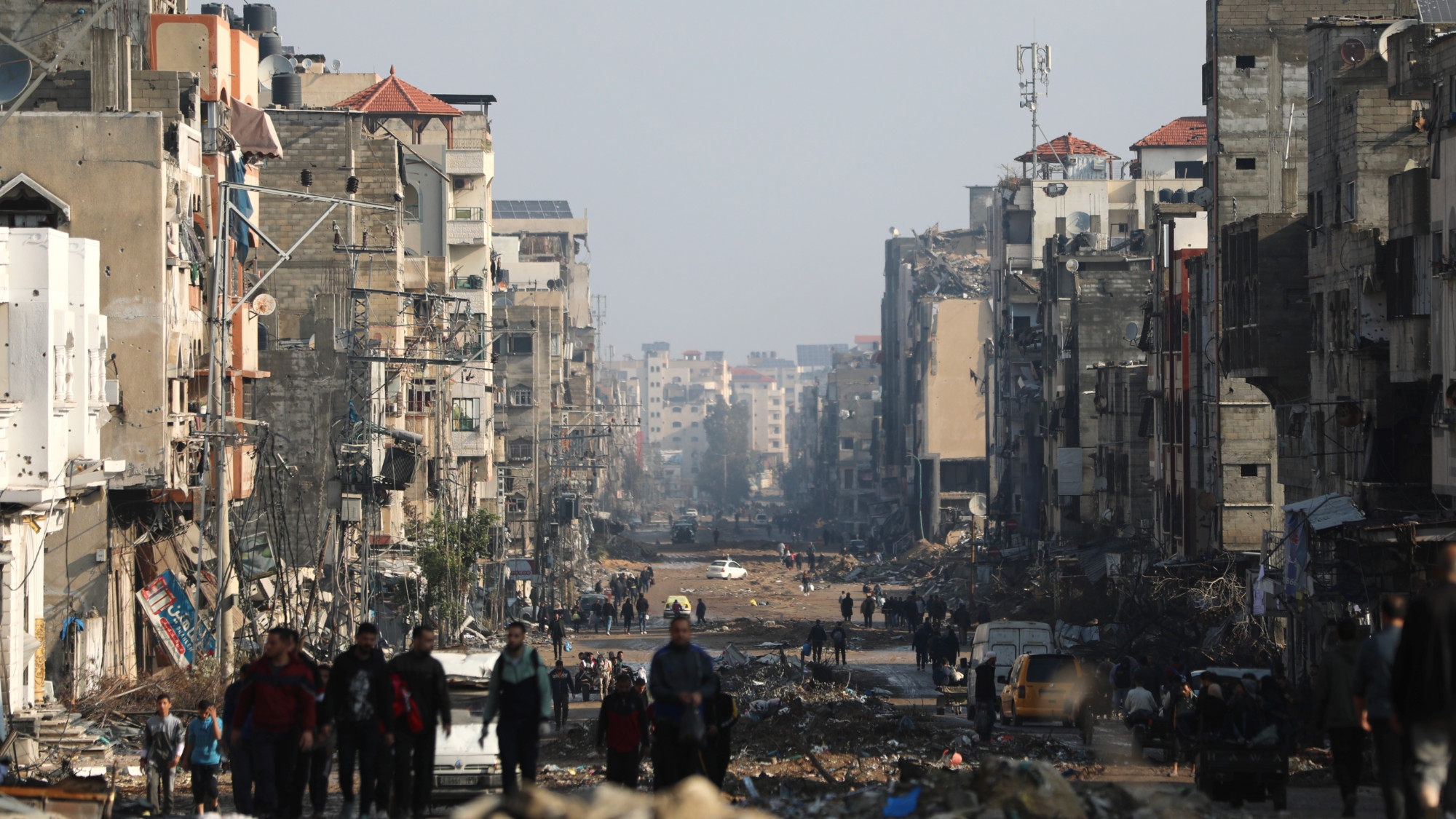
When Yara Waheidi fled her home in mid-October, she was under the impression that Israel's war on Gaza would last just a few days.
Packing light clothes for her three young children into a small suitcase, she made the arduous journey south, first to Gaza City, then to Nuseirat, and finally to Deir al-Balah in the central Gaza Strip.
Braving air strikes and Israeli sniper fire, she continued to flee to an ever-shrinking area of the enclave with only one hope in mind: surviving the Israeli onslaught.
But after 100 days of terror, Waheidi says she's come to realise that her plight will likely worsen, with the protracted conflict showing no clear end in sight.
"When we decided to evacuate, I took a small bag with a few pieces of light clothes for my children," the 39-year-old told Middle East Eye.
New MEE newsletter: Jerusalem Dispatch
Sign up to get the latest insights and analysis on Israel-Palestine, alongside Turkey Unpacked and other MEE newsletters
"It was still autumn, and in Gaza we start wearing thick and heavy clothes by mid-December. I thought we wouldn't need them because the war wouldn't last until the end of October.
"But October ended, November ended, December ended, and now we're in January. In my worst nightmare, I never would have thought that we would be displaced for this long."
'For the world, these have been 100 days. For us, they feel like 100 years'
- Lamia Saqqa, displaced
Waheidi said that she is now considering fleeing again as Israel ramps up its air strikes and ground offensive in neighbourhoods adjacent to where she's currently found shelter.
"I cannot believe that after 100 days we're still talking about seeking shelter, where to go, and what place is safe.
"I'm tired. The harsh circumstances, the difficulties and challenges we face performing simple daily tasks, but more so, I'm mentally exhausted from thinking about what I should do and what will happen next."
Israel is emboldened by the west
For 100 days, the world has looked on as heavy Israeli bombardment and a ground invasion have reduced vast areas of Gaza to a ruined wasteland.
The decades-old Israeli-Palestinian conflict escalated on 7 October when Palestinian fighters led by Hamas burst into southern Israel following Israeli provocations at the third-holiest site in Islam, Jerusalem's Al-Aqsa Mosque.
After the high-tech border fence that surrounds the besieged Gaza Strip was overwhelmed, more than 1,100 people were killed in the attacks, the majority of them civilians, according to an MEE tally based on official figures.
Israel responded by launching thousands of air strikes on the densely populated enclave, cratering crowded urban areas and pancaking multi-storey residential buildings.
Much of northern Gaza has been reduced to a dusty wasteland, and nearly 24,000 Palestinians, more than two-thirds of them women and children, have been killed across the enclave.
Palestinians have repeatedly spoken of being unable to retrieve decomposing bodies from the streets for fear of being killed themselves.
A staggering 1.9 million Palestinians have been displaced, the majority of whom have had to ferry their children from place to place in search of ever-elusive safety.
In recent weeks, Israel has faced mounting international pressure to end its war but has been largely shielded by US diplomatic and military support.
On Saturday, Israeli Prime Minister Benjamin Netanyahu defiantly said his country would not be deterred by accusations that it was committing genocide against the Palestinians in Gaza.
"No one will stop us, not The Hague, not the Axis of Evil, no one," he said, referring to the International Court of Justice (ICJ) where South Africa accused Israel of genocide earlier this week.
An interim ICJ ruling is expected in a few weeks, but the court has few means of enforcing any measures it might propose. Any outcome is therefore likely to be symbolic.
In 2004, the court issued a non-binding opinion that Israel's construction of its concrete barrier wall in the occupied West Bank was illegal and that it should be dismantled. More than 20 years later, walls and fences are still standing.
'Israel is treating us as if we are sub-human'
At the start of the war, Israel's defence minister, Yoav Gallant, described the Palestinians as "human animals" when he announced Israel would cut food, electricity, water and fuel supplies to the besieged enclave.
Abu Muhammed Gharbi, a 55-year-old who has been repeatedly displaced since the start of the conflict, said the Israeli government genuinely believed the Palestinians were sub-human and was intent on subjecting them to inhumane treatment.
"We are taking shelter in places suitable only for dogs," Gharbi told MEE on a garbage-filled street in Deir al-Balah, in the central Gaza Strip.
"No human can live under these circumstances. Yet, we have been living like this for more than three months now, a quarter of a year."
Gharbi has conceded that many Palestinians, should they survive the war, may not have a home to return to.
"The impact of the war is devastating, but the true extent will only become apparent once we return to Gaza, back to our homes and neighbourhoods, and witness the actual amount of destruction. There, we will face displacement again until we rebuild our homes or find alternatives."
According to figures from the Palestinian government media office in Gaza, cited by the UN Office for the Coordination of Humanitarian Affairs, an estimated 65,000 residential units have been destroyed or rendered uninhabitable and another 290,000 have been damaged.
A United Nations Satellite Center assessment, which covered just the first 50 days of the war, found around 18 percent of Gaza structures had been destroyed or damaged.
'Each minute, we are terrified that the next minute we will receive bad news, or our home will be bombed'
- Lamia Saqqa, displaced
Meanwhile, analysis of satellite data cited by the Associated Press suggests that about two-thirds of all structures in northern Gaza have been destroyed.
The AP said that the rate of devastation was worse than either the 2012-2016 siege of Aleppo in Syria or Russia's bombing of Mariupol in 2022.
"This is a war of attrition; it has lasted this long with an intention to exhaust Palestinians on all levels," Gharbi said.
"Today, our daily main concern revolves around securing water for drinking and washing, finding food, trying to contact family members to make sure they are ok, and where to take shelter. The more it lasts, the more people will feel drained and exhausted
"After this war ends - who knows when - we will likely need at least 15 years to rebuild what was destroyed, and maybe a lifetime to heal the deep psychological wounds and the endless complex traumas."
Days like years
For Lamia Saqqa, who is at present in Gaza City, nearly every day since 7 October has been marked by pain and loss.
"For the world, these have been 100 days. For us, they feel like 100 years," she told MEE.
"Each minute, we are terrified that the next minute we will receive bad news, or our home will be bombed. Each hour, we are struggling with new challenges trying to secure food and water," she said.
Sanitary conditions are dire, and Palestinians can routinely be seen scrambling for food brought in by occasional aid trucks from Egypt.
According to a December study by the Euro-Med Human Rights Monitor, 98 percent of respondents said they were eating insufficient food, while 64 percent of the participants admitted to eating grass, fruits, immature food and expired materials to satiate their hunger.
The study found that the rate of access to water, including drinking, bathing and cleaning water, was just 1.5 litres per person per day.
This is 15 litres less than the minimum amount of water required for survival at the level required by international standards, Euro-Med said.
Referencing the novel One Hundred Years of Solitude by Colombian author Gabriel Garcia Marquez, Saqqa said the Palestinians felt abandoned by the outside world.
"It has been 100 days of isolation. We have been cut off from the outside world, facing constant blackouts and feeling abandoned as the world allows this tragedy to continue," she said.
"If there's one thing I learned during these last 100 days, it's that the international community and their focus on human rights is a big lie.
"There are no human rights."
This article is available in French on Middle East Eye French edition.
Middle East Eye delivers independent and unrivalled coverage and analysis of the Middle East, North Africa and beyond. To learn more about republishing this content and the associated fees, please fill out this form. More about MEE can be found here.


